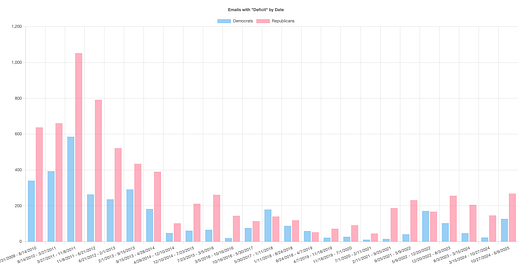Deficits: The Story Congress Tells When It Wants To
15 years of deficit talk in Congress shows what today’s relative quiet says about priorities and power
For all the talk about the House passed One Big Beautiful Bill Act, there has not been a lot of chatter about deficits. In some ways this is surprising because the Congressional Budget Office estimates that the bill would amount to $551 billion over the 2025–2034, with a $3 trillion cumulative effect on deficits. But in other ways it makes sense that there would not be a lot of deficit talk because the party who is trying to usher this through, has traditionally been the party who worries more and talks more about deficit spending.
The time when we had the greatest focus on deficits in official communications was back in 2009-2014 when the U.S. was trying to crawl out of the Great Recession and using a good deal of government spending to do so. This also coincided with the effort to expand health care through the Patient Protection and Affordable Care Act. And the topic was a favorite of members of Congress who considered themselves to be a part of the Tea Party movement. Since then, deficits have been a topic in congressional communications, but much less than before. And when comparing the volume of communications, mentions of “deficits” certainly don’t follow the overtime variations of yearly deficits.
Data: Treasury.gov
Both Democrats and Republicans write to constituents about their efforts to reduce the deficit. When Democrats mention the deficit they tend to talk about bills supported by Republicans that add to the deficit, and couch their concerns as being about the long term health of the economy. When working on policy defense when actions like the ACA or infrastructure funding are challenged, they make arguments about how these actions should actually reduce the deficit.
-Congressman Emanuel Cleaver (D-MO) Dec 31, 2010
Republicans tend to use fiscal responsibility framing, with a focus on curbing government spending and reducing tax burdens. They are also far more likely to mention deficits in criticisms of sitting Democratic presidents. Back in 2014 Congressman Walter B. Jones (R-NC) wrote,
This month, Congress passed a $1.1 trillion, 1,603 page CRomnibus spending bill. I voted against this bill because it provides funding for President Obama's unconstitutional amnesty for illegal aliens, hundreds of billions of dollars of more deficit spending, billions of dollars in deficit-financed foreign aid, billions of dollars for President Obama's unauthorized wars, funding for Obamacare, a Wall Street giveaway, and a lot of other troubling things. Members of Congress were also not given sufficient time to read this massive bill before voting on it. I have voted against every debt ceiling increase in the past 11 years, and I will not vote for a bill that continues Washington's out-of-control spending habit.
More recently on December 21, 2023 Congressman Clay Higgins (R-LA) told constituents about how the Freedom Caucus would do what they could to correct years of deficit spending.
When Obama was in office Republicans sent twice as many e-newsletters concerned about deficits than Democrats did. When Trump was in office they sent more deficit mentioning e-newsletters, but the ratio went from 2:1 to 1.3:1. During Biden’s term Republicans sent three times as many e-newsletters on the subject. Since the beginning of Trump’s second term overall focus is down, and the Republican to Democrat ratio is back to 2:1.
In the end, congressional concern over deficits seems to ebb and flow less with actual fiscal conditions and more with politics. When Democrats hold the presidency, Republicans ramp up their rhetoric about deficits and overspending. When Republicans are in control deficit talk fades. What this tells us is that while deficits are often framed as a moral or economic imperative, over the last 15 years they’ve often just been wielded as a partisan tool.








